GVU 25th Anniversary Impact Awards
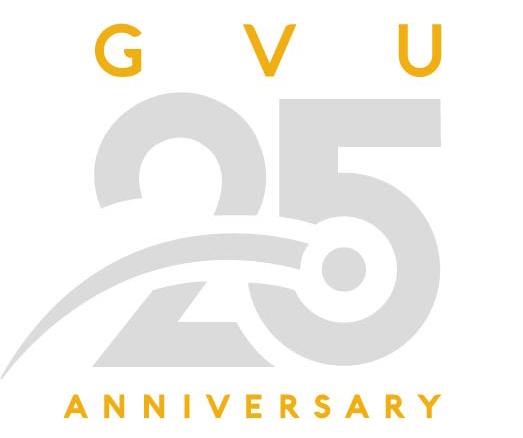 The Georgia Tech GVU Center is a university-wide interdisciplinary research center dedicated to improving the human condition through technology. Founded in 1992 as the Graphics, Visualization, and Usability Center, GVU has grown to include over 100 faculty and almost 400 students who span all six colleges at Georgia Tech. Together, this group brings together deep insight into human behavior, culture, and abilities, coupling it with the technological innovation and creativity to imagine, design, and build the future.
The Georgia Tech GVU Center is a university-wide interdisciplinary research center dedicated to improving the human condition through technology. Founded in 1992 as the Graphics, Visualization, and Usability Center, GVU has grown to include over 100 faculty and almost 400 students who span all six colleges at Georgia Tech. Together, this group brings together deep insight into human behavior, culture, and abilities, coupling it with the technological innovation and creativity to imagine, design, and build the future.
Building on this 25-year heritage of interdisciplinary research, GVU has established itself as one of the U.S.'s preeminent academic research centers. As computing technology weaves its way through our society, GVU's focus areas have extended far beyond the original graphics, visualization, and usability, to encompass virtually every facet of the human use of interactive technology, including augmented reality, digital civic engagement, collaborative work, educational technologies, digital media, gaming, health informatics, technology for international development, mobile and ubiquitous computing, music technology, social computing, and more.
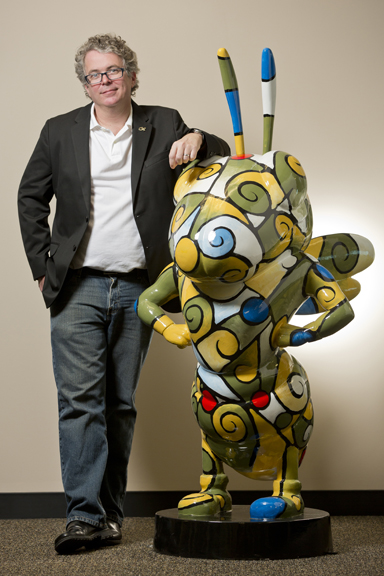 To commemorate the 25th anniversary of the founding of the GVU Center, we are honoring and celebrating the contributions of a handful of passionate, skillful, and committed individuals through the GVU Impact Awards. Each of the individuals featured in this booklet has played a key role in our quarter-century history, and embodies the interdisciplinary mindset and commitment to real-world impact that is a hallmark of GVU's identity. Through their leadership, service, and research excellence, they have changed the way we use computing technology, advanced the frontiers of knowledge, and strengthened the GVU community at Georgia Tech.
To commemorate the 25th anniversary of the founding of the GVU Center, we are honoring and celebrating the contributions of a handful of passionate, skillful, and committed individuals through the GVU Impact Awards. Each of the individuals featured in this booklet has played a key role in our quarter-century history, and embodies the interdisciplinary mindset and commitment to real-world impact that is a hallmark of GVU's identity. Through their leadership, service, and research excellence, they have changed the way we use computing technology, advanced the frontiers of knowledge, and strengthened the GVU community at Georgia Tech.
It's my great honor to recognize and thank each of our Impact Award winners for their contributions and accomplishments; I look forward to seeing their stories inspire new generations of the GVU community.
Keith Edwards
GVU Director
2017 RECIPIENTS
Mike Best
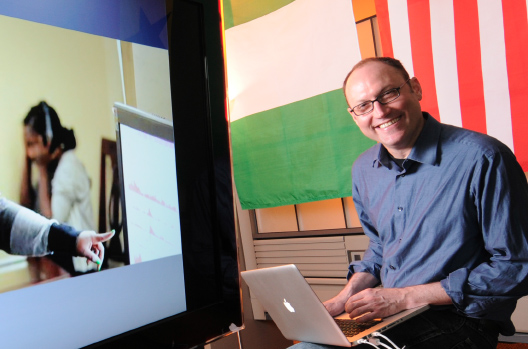 Mike Best is being honored for his outstanding research contributions in the field of development. Mike is famous for his pioneering work in applying information and communication technologies to international development problems, often referred to as ICT4D. For example, Mike has developed and deployed tools that use social media to monitor national elections in African nations, enabling real-time response to issues such as fraud, intimidation and violence.
Mike Best is being honored for his outstanding research contributions in the field of development. Mike is famous for his pioneering work in applying information and communication technologies to international development problems, often referred to as ICT4D. For example, Mike has developed and deployed tools that use social media to monitor national elections in African nations, enabling real-time response to issues such as fraud, intimidation and violence.
He has helped to establish Georgia Tech as a leader in this emerging area. But beyond Georgia Tech, he was instrumental in promoting ICT4D as an academic discipline, having founded the area's most significant journal, Information Technologies for International Development, and helping to lead its largest conference, ICTD. Mike is the recipient of multiple awards, including the Stephen A. Denning Faculty Award for Global Engagement and the Ivan Allen Faculty Legacy Award.
Mike currently directs the United Nations University Institute on Computing and Society in Macao, China, while on leave from his position as Associate Professor in the Sam Nunn School of International Affairs and School of Interactive Computing at Georgia Tech. Under his leadership, the UNU-CS is developing the next generation of computer and social scientists who will shape the global information society.
Amy Bruckman
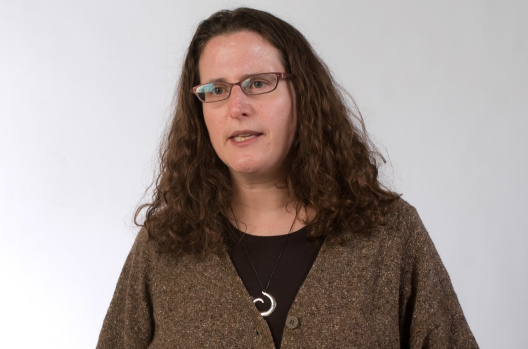 Amy Bruckman is being honored for her outstanding contributions to research and education in the GVU Center. Amy is best known for her pioneering work in the study and design of online communities, and has been exploring socialization and collaboration on the Internet since before we used the term “social media.” She has played a pivotal role in establishing the social computing research area at GVU and growing this group into one of international prominence.
Amy Bruckman is being honored for her outstanding contributions to research and education in the GVU Center. Amy is best known for her pioneering work in the study and design of online communities, and has been exploring socialization and collaboration on the Internet since before we used the term “social media.” She has played a pivotal role in establishing the social computing research area at GVU and growing this group into one of international prominence.
Amy is an expert on issues around online identity, information ethics, peer production of content, and constructionist learning (among many other topics). She has also been recognized by the American Educational Research Association as a recipient of the Jan Hawkins Award, given for her contributions to humanistic research and scholarship in learning technologies.
Amy is a Professor in the School of Interactive Computing, and currently serves as Interim Chair of the School. She has also played a major role in involving large numbers of Georgia Tech undergraduates in research, by founding the College of Computing's Undergraduate Research Opportunities in Computing (UROC) program, and by helping to lead the transition of this to a Georgia Tech-wide program.
Carl DiSalvo
 Carl DiSalvo is being honored for his research excellence as well as for his leadership role in connecting GVU and Georgia Tech researchers to the broader community. Carl has been instrumental in developing a research agenda that builds ties to community partners to inform that research, and-in conjunction-has a positive impact on the communities in which he works. He has also been an international leader in integrating the disciplines of design, the social sciences, and the humanities.
Carl DiSalvo is being honored for his research excellence as well as for his leadership role in connecting GVU and Georgia Tech researchers to the broader community. Carl has been instrumental in developing a research agenda that builds ties to community partners to inform that research, and-in conjunction-has a positive impact on the communities in which he works. He has also been an international leader in integrating the disciplines of design, the social sciences, and the humanities.
Carl DiSalvo is an Associate Professor in the Digital Media Program in the School of Literature, Media, and Communication at Georgia Tech, where he directs the Public Design Workshop, a design research studio that explores socially-engaged design and civic media. His research focuses on domains that range from smart cities, to the internet of things, to environmental monitoring, to urban farming. A unifying theme in his research is how participatory and public design work can help us articulate community issues and give us resources for new forms of community action.
Carl also plays many other roles at Georgia Tech and in GVU, including co-directing the Digital Interdisciplinary Liberal Arts Center, leading the Serve-Learn-Sustain Fellows program, and serving as the Director of the Digital Media track in Georgia Tech's interdisciplinary Masters in Human-Computer Interaction degree. He's the author of the MIT Press book Adversarial Design and co-editor of the MIT Press journal Design Issues. His experimental design work has been exhibited and supported by the Center for Art and Media, Karlsuhe, Germany, the Grey Area Foundation for the Arts in San Francisco, the Times Square Arts Alliance, and more.
Miguel Encarnação
 Miguel Encarnação is being honored for his role as a longtime GVU research collaborator, and Advisory Board member. Miguel has not only been a serial entrepreneur, he's also been a serial supporter of the GVU Center. During his time at Humana and ACT, he established collaborations with GVU faculty members in areas ranging from serious gaming as a means for skills training and evaluation, to using sensors and data dashboards as a way to promote exercise and healthy living among grade school kids.
Miguel Encarnação is being honored for his role as a longtime GVU research collaborator, and Advisory Board member. Miguel has not only been a serial entrepreneur, he's also been a serial supporter of the GVU Center. During his time at Humana and ACT, he established collaborations with GVU faculty members in areas ranging from serious gaming as a means for skills training and evaluation, to using sensors and data dashboards as a way to promote exercise and healthy living among grade school kids.
Miguel is currently the Chief Technology and Innovation Officer at QED Group. He has a 20+ year history of interdisciplinary innovation and leadership, having served as the Chief Innovation Officer at ACT, Inc., Director and Partnership Leader of Emerging Technology Innovation at Humana, and numerous other corporate and academic positions.
Miguel is also well known for his research contributions in computer graphics, visualization, and human-computer interaction, and serves as the Editor-in-Chief of IEEE Computer Graphics and Applications, and as members of both the ACM SIGGRAPH and IEEE Visualization Pioneers groups.
Maribeth Gandy Coleman
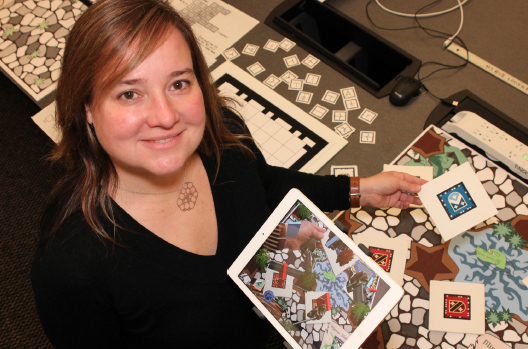 Maribeth Gandy Coleman is being honored for her leadership in establishing productive partnerships between GVU researchers and industry collaborators, as well as for her extensive research contributions. Maribeth is the Director of the Interactive Media Technology Center and the Director of the Wearable Computing Center at Georgia Tech. She plays a key role in bringing many GVU innovations out of the lab and into the marketplace. By fostering collaborations with industry, she has built partnerships between academic researchers and industry partners, doing the translational work needed to go from prototype to product.
Maribeth Gandy Coleman is being honored for her leadership in establishing productive partnerships between GVU researchers and industry collaborators, as well as for her extensive research contributions. Maribeth is the Director of the Interactive Media Technology Center and the Director of the Wearable Computing Center at Georgia Tech. She plays a key role in bringing many GVU innovations out of the lab and into the marketplace. By fostering collaborations with industry, she has built partnerships between academic researchers and industry partners, doing the translational work needed to go from prototype to product.
Maribeth is a computer scientist with a long history of innovation in areas ranging from Augmented Reality to Mobile Computing to Human-Computer Interaction. Her research combines deep technical knowledge with an interest in bringing HCI techniques for design and evaluation to bear on challenging problems.
She was the lead architect on the influential open source project, the Designer's Augmented Reality Toolkit (DART), has collaborated to integrate real-time augmented reality effects into Duran Duran's live concerts, and has designed and implemented mobile AR applications in domains ranging from advertising to gaming to education.
Scott Gilliland
 Scott Gilliland is being honored for his community leadership within GVU and his substantial contributions to many GVU research and educational projects over the years. Scott is a Research Scientist in the Interactive Media Technology Center, where he serves as the technical leader of the GVU Prototyping Laboratory, instructor for an innovative course on prototyping interactive appliances, and a consultant and advisor for numerous projects, both formally and informally.
Scott Gilliland is being honored for his community leadership within GVU and his substantial contributions to many GVU research and educational projects over the years. Scott is a Research Scientist in the Interactive Media Technology Center, where he serves as the technical leader of the GVU Prototyping Laboratory, instructor for an innovative course on prototyping interactive appliances, and a consultant and advisor for numerous projects, both formally and informally.
Scott's contributions to the research endeavors of GVU students and faculty are too numerous to list. He's worked extensively on projects ranging from wearable computers for underwater use, conductive textile sensing and fabrication for use in electronic garments, and interface vests for service animals. Currently, he is collaborating with partners in Aerospace Engineering on satellite designs.
Scott is an expert in hardware and software development and a broad range of fabrication technologies, and does not hesitate to share his knowledge with faculty and students in support of their work. He has played a key role in establishing the GVU Prototyping Lab as not just a technology resource on campus, but as a learning resource as well.
Scott Hudson
 Scott Hudson, a past GVU faculty member, is being honored for his foundational contributions to user interface software technology, and his leadership in the human-computer interaction community. Scott was an Associate Professor at Georgia Tech during the founding of the GVU Center and served as one of its earliest Associate Directors.
Scott Hudson, a past GVU faculty member, is being honored for his foundational contributions to user interface software technology, and his leadership in the human-computer interaction community. Scott was an Associate Professor at Georgia Tech during the founding of the GVU Center and served as one of its earliest Associate Directors.
Scott is currently a Professor in the Human-Computer Interaction Institute in the School of Computer Science at Carnegie Mellon University, where he serves as the founding director of the HCII Ph.D. program, the first Ph.D. program in the US dedicated solely to human-computer interaction.
Scott is well known for his extensive contributions to user interface software and technology, including innovative 2D graphical interfaces; his work has had a strong influence on commercial systems. He is also a pioneer in 3D modeling and fabrication, including innovative 3D printing techniques that allow the creation of soft interactive objects. Although his work spans many areas, he says that his focus “has always revolved around the invention and building of things which lead to a better user experience.”
Scott is an elected member of the CHI Academy, and is one of the most prolific authors in the technical HCI community. He's a founding Associate Editor for ACM Transactions of Human-Computer Interaction, and in 2017 was honored with the 2017 SIGCHI Lifetime Achievement in Service.
Jennifer Mankoff
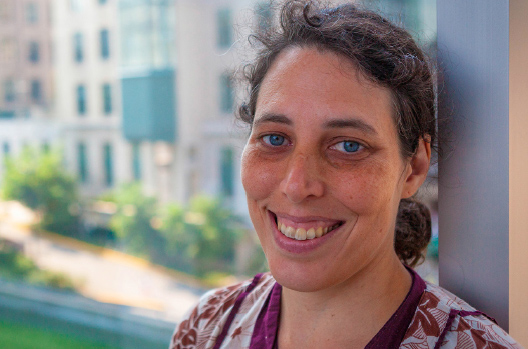 Jennifer Mankoff, a 2001 Ph.D. graduate in Computer Science from Georgia Tech, is being honored for her research contributions in accessibility, health, and sustainability. Her work combines empirical methods with deep technical innovation to create innovative new interactive technologies. For example, she is famous for her work on 3D printing and its potential for creating custom assistive technologies for people with disabilities. She's also well known for her work in exploring the use of natural materials in computing, such as embedding textiles in 3D printing, and creating knitted objects programmatically. Her work leverages novel technologies to support education through “maker movement”-style approaches.
Jennifer Mankoff, a 2001 Ph.D. graduate in Computer Science from Georgia Tech, is being honored for her research contributions in accessibility, health, and sustainability. Her work combines empirical methods with deep technical innovation to create innovative new interactive technologies. For example, she is famous for her work on 3D printing and its potential for creating custom assistive technologies for people with disabilities. She's also well known for her work in exploring the use of natural materials in computing, such as embedding textiles in 3D printing, and creating knitted objects programmatically. Her work leverages novel technologies to support education through “maker movement”-style approaches.
Currently, Jen is the Richard E. Ladner Endowed Professor in Computer Science & Engineering at the University of Washington. Prior to this appointment, she was a Professor in the Carnegie Mellon Human- Computer Interaction Institute, and a member of the faculty in Electrical Engineering and Computer Science at the University of California, Berkeley.
While at Georgia Tech, Jen was advised by Gregory Abowd and Scott Hudson. She's the recipient of numerous awards, including the Sloan Fellowship and the IBM Faculty Fellowship, among others. She's published nearly 100 papers in the top research venues in the field, many of which have garnered best paper awards.
Ed Price (1969 - 2017)
 Ed Price is being honored for his longtime community leadership within GVU, particularly for his important role in establishing and leading a wide range of industry partnerships. He led many research efforts, including the award-winning Odyssey Online educational program, which teaches cultural history through archeological artifacts, and the development of audio search technology that was spun off as Nexidia, Inc. He was past chair of the International Video Development Initiative, the lead organization behind the ITU H.350 videoconferencing standard. In 1995, he helped develop the first IP-based home telemedicine system with full motion video. One of his most influential projects was the development of the interactive video system used as a part of Atlanta's successful 1996 Olympic bid. Many GVU faculty and students relied on Ed to be the person who knew how to navigate Georgia Tech.
Ed Price is being honored for his longtime community leadership within GVU, particularly for his important role in establishing and leading a wide range of industry partnerships. He led many research efforts, including the award-winning Odyssey Online educational program, which teaches cultural history through archeological artifacts, and the development of audio search technology that was spun off as Nexidia, Inc. He was past chair of the International Video Development Initiative, the lead organization behind the ITU H.350 videoconferencing standard. In 1995, he helped develop the first IP-based home telemedicine system with full motion video. One of his most influential projects was the development of the interactive video system used as a part of Atlanta's successful 1996 Olympic bid. Many GVU faculty and students relied on Ed to be the person who knew how to navigate Georgia Tech.
Until his retirement from Georgia Tech at the age of 47, Ed was the Director of Research Partnerships and Development for the Institute for People and Technology, and the former Research Director of the Interactive Media Technology Center at Georgia Tech, as well as one of the founders of the latter.
Ed passed away in April, 2017, shortly after his retirement. He had a tremendous impact on Georgia Tech both through his professional contributions as a researcher, leader, and mentor, and through his long friendships to so many across Georgia Tech.
Bill Ribarsky (1944 - 2017)
 Bill Ribarsky is being honored for his community leadership within GVU, particularly for his seminal role during the establishment of the GVU Center. As the founder of the Georgia Tech Scientific Visualization Lab, he brought that lab and its significant resources and expertise into the GVU Center in 1992. Bill was extremely prominent in the national and international visualization communities, serving as the chair of the IEEE Visualization Conference, chair of the IEEE Technical Committee on Visualization and Graphics, co- Chair of the Eurographics-IEEE Symposium on Visualization (VisSym '99, the first joint EG-IEEE visualization conference in Europe), and many more.
Bill Ribarsky is being honored for his community leadership within GVU, particularly for his seminal role during the establishment of the GVU Center. As the founder of the Georgia Tech Scientific Visualization Lab, he brought that lab and its significant resources and expertise into the GVU Center in 1992. Bill was extremely prominent in the national and international visualization communities, serving as the chair of the IEEE Visualization Conference, chair of the IEEE Technical Committee on Visualization and Graphics, co- Chair of the Eurographics-IEEE Symposium on Visualization (VisSym '99, the first joint EG-IEEE visualization conference in Europe), and many more.
Bill was formerly the Bank of America Endowed Chair in Information Technology at the University of North Carolina, Charlotte. Prior to that, he was Principal Research Scientist and Associate Director of External Relations for the GVU Center.
Bill passed away in Feburary, 2017 as a result of injuries sustained from a serious bicycling accident. He left a substantial research and leadership legacy at both UNC Charlotte and Georgia Tech. At UNCC, he was the founding director of the Charlotte Visualization Center, and also served as chair of the Computer Science department from 2008-2014.
John Stasko
 John Stasko is being honored for his seminal contributions to the field of information visualization, including visual analytics and software visualization. John was at Georgia Tech at the founding of the GVU center, and is one of the people most responsible for the Center's leading national and international role in visualization. He also served as one of the earliest Associate Directors for GVU.
John Stasko is being honored for his seminal contributions to the field of information visualization, including visual analytics and software visualization. John was at Georgia Tech at the founding of the GVU center, and is one of the people most responsible for the Center's leading national and international role in visualization. He also served as one of the earliest Associate Directors for GVU.
John's early work on algorithm animation helped show the role that visual media could play in programming. He was the lead editor of the MIT Press book Software Visualization: Programming as a Multimedia Experience, generally considered to be one of the foundational references of that field. More recently, he has been a pioneer in the emerging field of visual analytics and was a contributor to the book Illuminating the Path, which laid out a research agenda for visual analytics.
Currently a Professor of Interactive Computing at Georgia Tech, John directs the Information Interfaces Research Group. He says his group's mission “is to help people take advantage of information to enrich their lives.”
John is one of the most prolific and well-cited authors in his field. He is a Distinguished Scientist of the ACM and an IEEE Fellow, an elected member of the CHI Academy, and was named an Honorary Professor in the School of Computer Science at the University of St. Andrews in Scotland.
Terence West
 Terence West is being honored for his role as a longtime GVU Advisory Board Member, partner, and research collaborator. With a background in Industrial Design and Product Development, Terry has led interdisciplinary research groups in the U.S. and in Europe and has been a key partner in establishing Georgia Tech's long-running collaboration with Steelcase.
Terence West is being honored for his role as a longtime GVU Advisory Board Member, partner, and research collaborator. With a background in Industrial Design and Product Development, Terry has led interdisciplinary research groups in the U.S. and in Europe and has been a key partner in establishing Georgia Tech's long-running collaboration with Steelcase.
Terry's teams have been recognized with over 40 national and international design awards, from the U.S., Europe, and Japan, and Terry was the industrial design lead for the influential Alto computer from Xerox PARC, the world's first networked graphical computer.
Terry's collaboration with GVU led to the establishment of the inSpace project, a multi-year collaboration that resulted in innovative blended physical and digital designs for collaborative work. His design sensibilities and research leadership helped to shape the direction of that project over the course of many years, helping to map out new intellectual territory. Terry is also a long-time external reviewer and supporter of GVU's Foley Scholars program, and a champion for the students who have been awarded that honor.
Christopher Le Dantec and Kari Watkins
 Christopher Le Dantec and Kari Watkins are being honored for their research excellence and their roles in establishing a research program that directly connects Georgia Tech researchers with the City of Atlanta. Chris and Kari's CycleAtlanta project is an innovative example of a partnership between research and government: CycleAtlanta crowdsources data about the routes cyclists take through the city; this data is then used by city planners to make infrastructure investments to encourage ridership. This project explores new forms of civic participation and advocacy, and helped to establish GVU's research partnership with the City.
Christopher Le Dantec and Kari Watkins are being honored for their research excellence and their roles in establishing a research program that directly connects Georgia Tech researchers with the City of Atlanta. Chris and Kari's CycleAtlanta project is an innovative example of a partnership between research and government: CycleAtlanta crowdsources data about the routes cyclists take through the city; this data is then used by city planners to make infrastructure investments to encourage ridership. This project explores new forms of civic participation and advocacy, and helped to establish GVU's research partnership with the City.
Chris is an Associate Professor of Digital Media in the School of Literature, Media, and Communication at Georgia Tech, where he studies community participation and community design practice. His work has spanned many aspects of participatory digital democracy, including community history, the impacts of technology on the urban homeless, and a broad focus on design research.
Kari is the Frederick Law Olmstead Associate Professor in the School of Civil and Environmental Engineering at Georgia Tech. Her research focuses on the use of technology in transit, particularly around issues of transit planning, improved traveler information, and encouraging alternative modes of transportation.
 The GVU-25 Impact Awards were custom-designed and hand-fabricated by Jake Tompkins of the Digital Fabrication Lab in Georgia Tech's College of Design. The awards highlight a blend of technology and artistry, reflecting the interdisciplinary spirit of GVU. Starting with a stainless steel skeleton, the design sandwiches etched glass plates within a stainless steel body, and is personalized for each recipient.
The GVU-25 Impact Awards were custom-designed and hand-fabricated by Jake Tompkins of the Digital Fabrication Lab in Georgia Tech's College of Design. The awards highlight a blend of technology and artistry, reflecting the interdisciplinary spirit of GVU. Starting with a stainless steel skeleton, the design sandwiches etched glass plates within a stainless steel body, and is personalized for each recipient.


